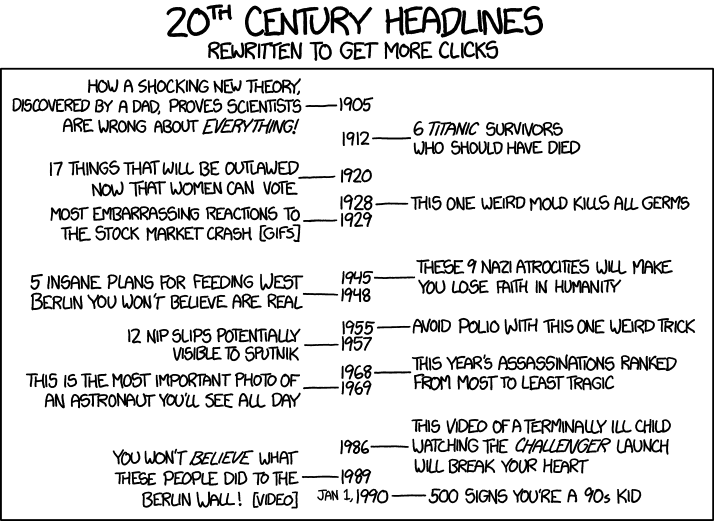I hate clickbait. I absolutely despise it. Clickbait is lazy. It’s manipulative. It’s distracting and disappointing. It’s an abomination. Death to clickbait!
What is clickbait? “Clickbaiting is the intentional act of over-promising or otherwise misrepresenting—in a headline, on social media, in an image, or some combination—what you’re going to find when you read a story on the web.” It uses headlines with provocative adjectives—stunning, amazing, unbelievable, shocking. It promises that it will blow your mind, that you won’t believe what you see, that it will change your life. You know clickbait when you see it. It’s made to be alluring, made to be so compelling that you click before you think.
Clickbait exists because there is so much media vying for our attention today.
Clickbait exists because there is so much media vying for our attention today. We are participants in an attention economy in which the easy currency is page views. Everyone wants page views! For companies and their sites, page views are closely tied to advertising and the money it brings. If you want to turn a profit, you’d better generate page views. For individuals and their blogs, page views are closely tied to influence and the opportunities it brings. If you want a book contract or a conference platform, you’d better be able to prove that you’ve got people clicking and reading.
There are easy ways and hard ways to generate page views. The hard way is to create great content—articles that are interesting, unique, compelling, worthwhile. It is no small feat to create content so strong that people will not only read it but also share it. The much easier way to generate page views is to create great headlines—or provocative ones, at least. With a great headline you’ll get the click, you’ll get the page view, and you don’t even need to invest all the time and effort in creating the great content. And this, of course, is where clickbait makes its appearance.
Clickbait goes wrong in at least two ways that ought to be especially convicting to Christian writers.
First, clickbait is a failure to tell the truth because it depends upon misrepresentation. It promises a lot but is almost invariably disappointing. The twelve life-changing productivity tips turn out to be old, weary ones you’ve heard a thousand times before. The mind-blowing new technique is pure gimmickry that wouldn’t work in a million years. The shocking photos are anything but. Clickbait is wax fruit—attractive but empty. It’s white bread—tasty but unsatisfying. It’s the Atlanta Braves—promising but disappointing. Whether it’s a straight-up lie or a mere stretch, clickbait fails the test of truth. Be warned: “Better is a poor person who walks in his integrity than one who is crooked in speech and is a fool” (Proverbs 19:1). And “Bread gained by deceit is sweet to a man, but afterward his mouth will be full of gravel” (Proverbs 20:17).
Clickbait exists where the writer or publisher is thinking of himself before others.
Second, clickbait is a failure to love. Clickbait exists where the writer or publisher is thinking of himself before others. His primary concern is not loving or serving other people by providing helpful, high-quality articles. No, his concern is building his own platform or stuffing his own pockets. This emphasis on money or influence works itself out in ways that frustrate the reader. As Christians we know better than to irritate others to benefit ourselves. Be challenged: “So then, as we have opportunity, let us do good to everyone, and especially to those who are of the household of faith” (Galatians 6:10) and “Love your neighbor as yourself” (Mark 12:31).
There is nothing wrong and everything right with a great headline. There is nothing right and everything wrong with clickbait. Sometimes the difference between the two is subtle or subjective, but it’s usually found in the content that lies beyond the headline. If the headline is true and realistic, if it accurately describes the content, it may just be a great headline. If it is inaccurate, stretching, gimmicky, it may just be clickbait.
Here are a few encouragements to Christian writers:
- Work hard to create headlines that are compelling but not gimmicky, that stand out in a crowded space but without resorting to manipulation and cheap tricks. Writing good headlines is a way you serve your readers.
- Give people what you promised in the headline. Maybe give them more. Never give them less.
- Keep an eye on your adjectives. If it’s not actually shocking, don’t say that it is. Don’t lead people to believe something is stunning or amazing unless you intend to prove that this is actually the case.
- Put your readers first by putting content first. Don’t write for money or platform—not as the matter of first importance. Write for the joy of serving others. Before you click “publish” ask whether or how this article and its headline will serve other people. Pray about it.
- Put the majority of your effort into creating articles that are true, that are deep, that are helpful, that are of the highest standards. Be willing to reject a great headline because it’s not quite true or not backed up by a great article. In fact, always be wary of an article that begins with a headline. It’s more likely that a good headline will follow a good article than vice versa.











